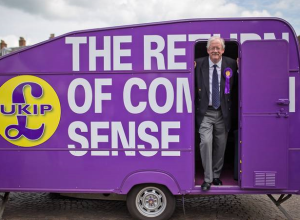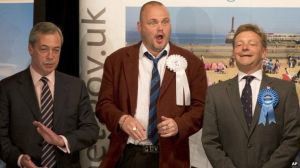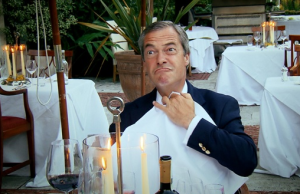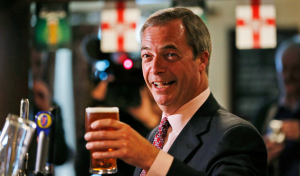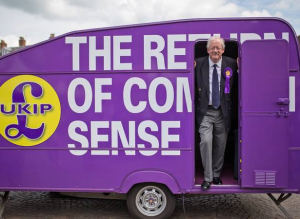By David Bates, Principal Lecturer in Politics and International Relations
How can we best interpret this strange phenomenon which is Nigel Farage, at the moment of his defeat? Let’s explore – and challenge – the Farage ABC.
A is for authenticity
Source: The Spectator
Farage’s claim to authenticity was always a curious one. How could this former commodity trader portray himself as the ‘man in the street’? Surely he was closer to the ‘Establishment’ than many – though perhaps not all – of the main party leaders. Indeed more than this. The front man of the Sex Pistols Sid Vicious was once asked by a journalist if he played for the ‘man in the street’. He replied ‘Nah… I’ve met the man in the street and he is a ****’ Farage’s implicit narrative was not any more respectful; rather it was premised on an image of the man in the street as a chain smoking, beer swilling anti-immigration Eurosceptic, who is completely disengaged from politics. Most importantly, it considered the marginalised as a mob which could be easily delivered up to the charismatic leader. There is what we might characterise as an ‘inauthenticity’ to his ‘authenticity’. Farage was not of the people. Rather, he despised the people; but without their desire, their affective power, he was nothing. For in South Thanet on Thursday at least, he could not deliver up the ‘mob’. Farage appeared not unlike the bloke in the pub who asks his rival out for a fight, expecting his friends to follow him – but who quickly finds that he is standing on his own in the rubbish strewn carpark. In South Thanet the people’s army appear – for whatever reason – to have stayed at home.
B is for Britishness
Source: National Post (Canada)
First we might ask: ‘How could Farage focus on “Britishness”, while married to a German national, whose ability to come to the UK in the first place was contingent on EU law?’ Second, and more fundamentally, we might question his very use of the concept of ‘Britishness’. For in effect, Farage was very successful in subsuming Britishness within a category of ‘Englishness’, and reducing ‘Englishness’ to a narrow and unreflective understanding of English nationalism. English nationalism is the dark side of the ‘imagined community’ which we term England. It is the fuel that stokes the hatred of the BNP, EDL, Britain First and a range of other racist far right organisations. It is also central to how Farage has been able to turn an anti-EU agenda into a simultaneously anti-immigration one. This played quite well generally in England – and at first glance well in South Thanet. Yet 28% of people voted for candidates who refuse such an agenda, and 64% for candidates other than the UKIP leader. The ‘silent majority’ proved to be more cosmopolitan in their attitudes than Farage would have had us believe. If UKIP could not deliver here, then future mobilisation will be a challenge – and even more so without the ‘charismatic’ power of their leader.
C is for common sense
Source: UKIP
Farage gave people simple solutions to complex problems. ‘It is just common sense that Polish workers are steeling the jobs of “indigenous workers”.’ ‘It is just common sense that Britain is full’. ‘Why can’t the liberal elites see this?’ Of course Farage’s argument pays no attention to the underlying issues, such as the impact of free market economics on labour migration (Farage claims to be a great supporter of the free market), the need which Britain has for young workers in order to offset the ‘demographic time bomb’, the cut in welfare expenditure (which he has a history of supporting), itself necessitated by the cost of the bank bailout, and which impacted most significantly on areas with a high density of migrant labour. Farage knows all this, but he knows ‘common sense’ is more likely to mobilise people than the real sense of analysis and reason. And – perhaps this is somewhat optimistic – reason may have at least won the day in South Thanet!
The real moral crime is the contempt in which Farage holds the electorate. This morning, was payback time!
 Politics
Politics Anna Vanaga
Anna Vanaga 987
987